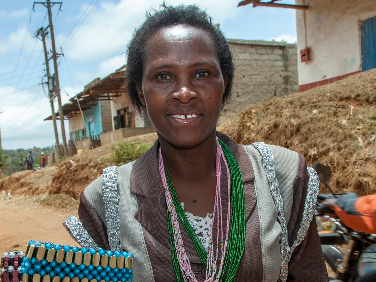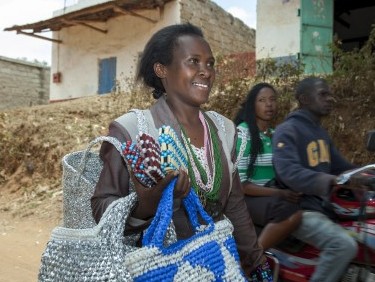
Benedetta, the basket weaver of Tala
Prior to getting involved with Hand in Hand, Benedetta Kalondu, a mother of two in her forties, was one of many women in her area just surviving on casual jobs. Today, Benedetta runs a small basket weaving business based on recycling, which produces an income of KES 7,000 (US $80) per month, employs two neighbours and has earned the respect of her community.
Starting out
 Benedetta lives in a hamlet near Tala, a town of around 200,000 56 kilometres east of Nairobi. Dry terraced fields cover every hill and subsistence farming sustains the families living here. However, the arid conditions mean that crops fail and famine regularly strikes the local community.
Benedetta lives in a hamlet near Tala, a town of around 200,000 56 kilometres east of Nairobi. Dry terraced fields cover every hill and subsistence farming sustains the families living here. However, the arid conditions mean that crops fail and famine regularly strikes the local community.
Looking back, Benedetta reflects that the first step on her journey to becoming a businesswoman was also the hardest. There were no immediate apparent benefits and no handouts available at the start of the Hand in Hand training. Instead, Benedetta and her friends were asked to start to plan their daily cash-flow and to save, moving away from a lifetime’s habit of living ‘hand-to-mouth’.
“My eldest son will finally complete school this year”
Finding a business niche
The business module of the training made Benedetta realise that what she had always thought of as an enjoyable hobby – making baskets – could in fact be turned into a money-making activity. As many types of baskets were already readily available in the local market, her Hand in Hand trainer, Mary Katoni, encouraged Benedetta to think of a way to differentiate her products.
Benedetta spotted an opportunity to recycle discarded silver foil paper into bright, shiny silver baskets. After showing her group a few prototypes, they encouraged her to follow up on the idea. Benedetta took out a loan of KES 10,000 (US $112) from the group fund to buy and transport raw materials.
Two of her fellow group members have since been trained by Benedetta in the technique, allowing her to expand her production. Marketing is the biggest priority for Benedetta as she lives in a remote hamlet, so she regularly walks with all her stock to the nearby Tala town market.
Tala, Kenya
A path out of poverty
What Benedetta appreciates most in the Hand in Hand approach is the support of her group, which she feels has alternatively challenged and encouraged her in her business ideas. She also learned from other members to grow vegetables on her ‘shamba’ (ancestral piece of land) to reduce her living costs. “I thought, if Alice can do this, I can also.” The group has set aside a welfare fund to pay for hospital bills when members become ill. To reward those members who invest in education, the group also contributes KES 1,500 (US $17) for all members’ children’s final exam fees once a year.
With Benedetta’s additional income, her family can now easily cover their daily needs and school fees are no longer a struggle. Benedetta’s eldest son – who had missed an entire school year as his parents were unable to pay for his fees – will finally complete school this year.
Benedetta’s results
![]()
Monthly income of KES 7,000 (US $80)
![]()
Access to bigger markets
![]()
Eldest son finishing school
Next case study: Meet Gloria, the former refugee growing crops – and profits
